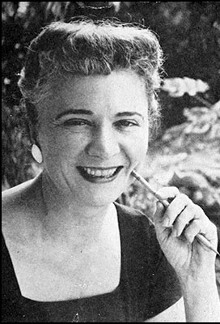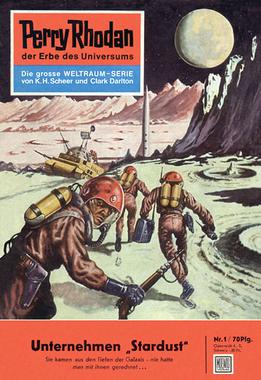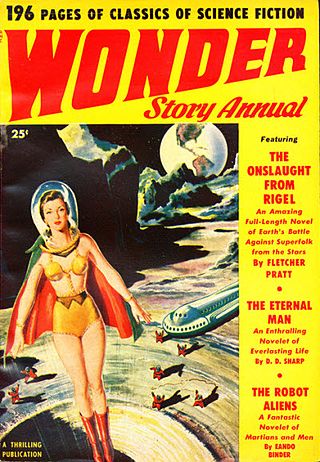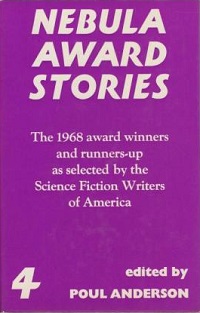Related Research Articles

Catherine Lucille Moore was an American science fiction and fantasy writer, who first came to prominence in the 1930s writing as C. L. Moore. She was among the first women to write in the science fiction and fantasy genres. Moore's work paved the way for many other female speculative fiction writers.

Donald Allen Wollheim was an American science fiction editor, publisher, writer, and fan. As an author, he published under his own name as well as under pseudonyms, including David Grinnell, Martin Pearson, and Darrell G. Raynor. A founding member of the Futurians, he was a leading influence on science fiction development and fandom in the 20th-century United States. Ursula K. Le Guin called Wollheim "the tough, reliable editor of Ace Books, in the Late Pulpalignean Era, 1966 and '67", which is when he published her first two novels in Ace Double editions.

Forrest James Ackerman was an American magazine editor; science fiction writer and literary agent; a founder of science fiction fandom; a leading expert on science fiction, horror, and fantasy films; a prominent advocate of the Esperanto language; and one of the world's most avid collectors of genre books and film memorabilia. He was based in Los Angeles, California.

Hannes Bok, pseudonym for Wayne Francis Woodard, was an American artist and illustrator, as well as an amateur astrologer and writer of fantasy fiction and poetry. He painted nearly 150 covers for various science fiction, fantasy, and detective fiction magazines, as well as contributing hundreds of black and white interior illustrations. Bok's work graced the pages of calendars and early fanzines, as well as dust jackets from specialty book publishers like Arkham House, Llewellyn, Shasta Publishers, and Fantasy Press. His paintings achieved a luminous quality through the use of an arduous glazing process, which was learned from his mentor, Maxfield Parrish. Bok shared one of the inaugural 1953 Hugo Awards for science fiction achievement.

Herstory is a term for history written from a feminist perspective and emphasizing the role of women, or told from a woman's point of view. It originated as an alteration of the word "history", as part of a feminist critique of conventional historiography, which in their opinion is traditionally written as "his story", i.e., from the male point of view. The term is a neologism and a deliberate play on words; the word "history"—via Latin historia from the Ancient Greek word ἱστορία, a noun meaning 'knowledge obtained by inquiry'— is etymologically unrelated to the possessive pronoun his.

Perry Rhodan is a German space opera franchise, named after its hero. It commenced in 1961 and has been ongoing for decades, written by an ever-changing team of authors. Having sold approximately two billion copies worldwide, it is the most successful science fiction book series ever written. The first billion of worldwide sales was celebrated in 1986. The series has spun off into comic books, audio dramas, video games and the like. A reboot, Perry Rhodan NEO, was launched in 2011 and began publication in English in April 2021.
Roger Elwood was an American science fiction author and editor, who edited a large number of anthologies and collections for a variety of publishers during the early to mid-1970s.
The Time Traveller was one of the earliest science fiction fanzines, started in 1932. It grew out of a New York City fan club called the Scienceers and was started by Mort Weisinger, Julius Schwartz, Allen Glasser, and Forrest J Ackerman. Initially, Glasser was the "Editor" of the zine, Weisinger "Associate Editor," Schwartz "Managing Editor," and Ackerman "Contributing Editor."

John Brian Francis "Jack" Gaughan, pronounced like 'gone', was an American science fiction artist and illustrator and multiple winner of the Hugo Award in the category of Best Professional Artist.

John E. Stith is an American science fiction and mystery author, known for the scientific rigor he brings to adventure and mystery stories.

Lesbian pulp fiction is a genre of lesbian literature that refers to any mid-20th century paperback novel or pulp magazine with overtly lesbian themes and content. Lesbian pulp fiction was published in the 1950s and 1960s by many of the same paperback publishing houses as other genres of fiction, including westerns, romances, and detective fiction. Because very little other literature was available for and about lesbians at this time, quite often these books were the only reference the public had for modeling what lesbians were. English professor Stephanie Foote commented on the importance of lesbian pulp novels to the lesbian identity prior to the rise of organized feminism: "Pulps have been understood as signs of a secret history of readers, and they have been valued because they have been read. The more they are read, the more they are valued, and the more they are read, the closer the relationship between the very act of circulation and reading and the construction of a lesbian community becomes…. Characters use the reading of novels as a way to understand that they are not alone." Joan Nestle refers to lesbian pulp fiction as “survival literature.” Lesbian pulp fiction provided representation for lesbian identities, brought a surge of awareness to lesbians, and created space for lesbian organizing leading up to Stonewall.

David Geddes Hartwell was an American critic, publisher, and editor of thousands of science fiction and fantasy novels. He was best known for work with Signet, Pocket, and Tor Books publishers. He was also noted as an award-winning editor of anthologies. The Encyclopedia of Science Fiction describes him as "perhaps the single most influential book editor of the past forty years in the American [science fiction] publishing world".
Jove Books, formerly known as Pyramid Books, is an American paperback and eBook publishing imprint, founded as an independent paperback house in 1949 by Almat Magazine Publishers. The company was sold to the Walter Reade Organization in the late 1960s. It was acquired in 1974 by Harcourt Brace which renamed it to Jove in 1977 and continued the line as an imprint. In 1979, they sold it to The Putnam Berkley Group, which is now part of the Penguin Group.
Janrae Frank was an American journalist, writer and editor known primarily for her work in science fiction and fantasy. She wrote extensively on the subject of women and feminism in speculative fiction.
Leslie Perri was the pen name of Doris Marie Claire "Doë" Baumgardt, an American science fiction fan, writer, and illustrator. She was a member of the Futurians, the influential science fiction fan club.

Imaginative Tales was an American fantasy and science fiction magazine launched in September 1954 by William Hamling's Greenleaf Publishing Company. It was created as a sister magazine to Imagination, which Hamling had acquired from Raymond A. Palmer's Clark Publishing. Imaginative Tales began as a vehicle for novel-length humorous fantasy, early issues featuring stories by Charles F. Myers and Robert Bloch. After a year, Hamling switched the focus to science fiction and it became similar in content to Imagination, publishing routine space operas. In 1958, with public interest in space high, Hamling changed the title to Space Travel, but there was little effect on sales. Magazine circulation was suffering because of the rise of the paperback, and the liquidation in 1957 of American News Company, a major magazine distributor, made it even harder for small magazines to survive. Hamling eventually ceased publication of both Imaginative Tales and Imagination in 1958, preferring to invest the money in Rogue, a men's magazine he had started in imitation of Playboy in 1955.
The role of women in speculative fiction has changed a great deal since the early to mid-20th century. There are several aspects to women's roles, including their participation as authors of speculative fiction and their role in science fiction fandom. Regarding authorship, in 1948, 10–15% of science fiction writers were female. Women's role in speculative fiction has grown since then, and in 1999, women comprised 36% of the Science Fiction and Fantasy Writers of America's professional members. Frankenstein (1818) by Mary Shelley has been called the first science fiction novel, although women wrote utopian novels even before that, with Margaret Cavendish publishing the first in the seventeenth century. Early published fantasy was written by and for any gender. However, speculative fiction, with science fiction in particular, has traditionally been viewed as a male-oriented genre.

Stuart James Byrne was an American screenwriter and writer of science fiction and fantasy. He published under his own name and the pseudonyms Rothayne Amare, John Bloodstone, Howard Dare, and Marx Kaye.

Wonder Story Annual was a science fiction pulp magazine which was launched in 1950 by Standard Magazines. It was created as a vehicle to reprint stories from early issues of Wonder Stories, Startling Stories, and Wonder Stories Quarterly, which were owned by the same publisher. It lasted for four issues, succumbing in 1953 to competition from the growing market for paperback science fiction. Reprinted stories included Twice in Time, by Manly Wade Wellman, and "The Brain-Stealers of Mars", by John W. Campbell.

Nebula Award Stories 4 is an anthology of award-winning science fiction short works edited by Poul Anderson. It was first published in the United Kingdom in hardcover by Gollancz in November 1969. The first American edition was published by Doubleday in December of the same year. Paperback editions followed from Pocket Books in the U.S. in January 1971, and Panther in the U.K. in December 1971. The American editions bore the variant title Nebula Award Stories Four.